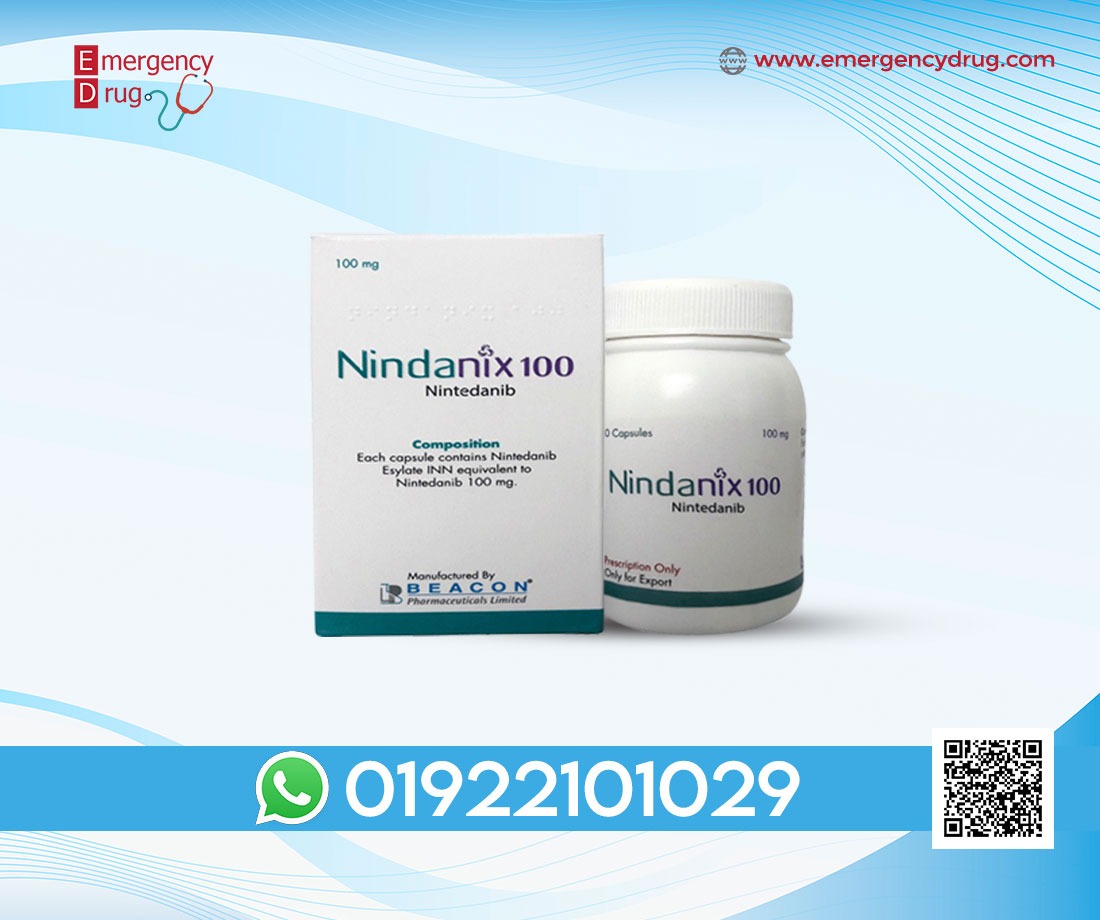
Briganix (Brigatinib) 180 MG – 30 Tablets
Price: $665.00
Briganix (Brigatinib) is an anaplastic lymphoma kinase inhibitor used to treat anaplastic lymphoma kinase positive metastatic non small cell lung cancer.
| Packaging Size | 180 mg |
| Brand | Beacon |
| Composition | Briganix 180 mg |
| Manufacturer | Beacon Bangladesh |
| Treatment | Lung Cancer |
| Form | 30 Tablets |


Description
Briganix (Brigatinib) is an anti-cancer (antineoplastic) Medicine. This Tablets is classified as an anaplastic lymphoma kinase inhibitor and as a tyrosine kinase inhibitor. Brigatinib is the generic name for the trade name drug Briganix
Working Principle
Briganix (Brigatinib) is not a chemotherapy drug, but one of what are termed “targeted therapies.”
Brigatinib, originally named AP26113, is a reversible dual inhibitor of anaplastic lymphoma kinase (ALK) and epidermal growth factor receptor (EGFR). It presents selectivity against the mutant forms of EGFR compared to the wild-type. It also exhibits selectivity against 9 different Crizotinib-resistant mutants of the EML4-ALK fusion gene, which is a pivotal player in the transformation of susceptible lung parenchyma.
Brigitanib inhibits proliferation and in vitro viability of cells expressing the fusion protein EML4-ALK as well as 17 crizotinib-resistant ALK mutants. Its action is expanded to cells expressing EGFR deletions, ROS1-L2026M, FLT3-F691L and FLT3-D835Y. Brigitanib presents a dose-dependent inhibition of tumor growth, tumor burden and prolonged survival in mice EML4-ALK xenograft models. Time course of Brigatinib and exposure-response studies are still unknown.
Briganix (Brigatinib) is a broad spectrum kinase inhibitor with activity against anaplastic lymphoma kinase (ALK) and many other factors. A kinase is an enzyme that helps cells grow and divide. Non-small cell cancer cells with ALK grow and divide faster. By binding to the anaplastic lymphoma kinase and these other factors, brigatinib blocks an important pathway that promotes cell division of these malignant cells.
Brigatinib Process Given
- Briganix is a tablet which may be taken with or without food.
- Swallow tablets whole with at least 8 oz. of water. Do not crush, chew, or dissolve tablets.
- Avoid grapefruit and grapefruit juice.
- Take Brigatinib at approximately the same time each day.
- Take Brigatinib as prescribed.
- Do not change your dose or stop Brigatinib unless your health care provider tells you to do so.
- If you miss a dose of Brigatinib, it should taken as soon as possible on the same day with return to the normal schedule the following day. Do not take extra capsules of Brigatinib to make up the next dose.
- Do not take more than 1 dose of Brigatinib at one time. Call your health care provider and go to the emergency room right away if you take too much.
- Store at room temperature (68° F to 77° F); keep medication in original bottle; protect from high humidity, moisture and light.
- Keep out of reach from children and pets.
- Safely throw away any Brigatinib that is out of date or unused (ask your provider for directions on how to discard the medication).
The amount of Briganix that you will receive depends on many factors, including your height and weight, your general health or other health problems, and the type of cancer or condition you have. Your doctor will determine your exact dosage and schedule.
Side Effects
Important things to remember about the side effects of Briganix:
- Most people will not experience all of the side effects listed.
- Side effects are often predictable in terms of their onset, duration, and severity.
- Almost always reversible and almost always go away after therapy is complete.
- There is no relationship between the presence or severity of side effects and the effectiveness of the medication.
- Many of the side effects may be quite manageable. There are many options to minimize or prevent the side effects of Brigatinib.
The following side effects are common (occurring in greater than 30%) for patients taking Brigatinib:
- Increased liver enzymes
- Hyperglycemia (high blood sugar)
- Increased creatine phosphokinase (CPK) level
- Increased amylase and/or lipase (pancreatic enzymes) level
- Nausea
- Anemia (low red blood cell count)
- Diarrhea
- Fatigue
- Cough
These are less common side effects (occurring in 10-29%) for patients receiving Briganix:
- Headache
- Decreased lymphocyte count (a type of white blood cell)
- Shortness of breath
- Rash
- Vomiting
- Decreased phosphorus level
- Decreased appetite
- Increased partial thromboplastin time (a factor in blood clotting which could increase risk of bleeding longer if increased)
- High blood pressure
- Constipation
- Abdominal pain
- Muscle spasm
- Back pain
- Muscle pain
- Joint pain
- Fever
- Numbness/tinging of hands and/or feet
- Insomnia (trouble sleeping)
- Limb pain
- Visual changes (blurred vision, double vision, decreased visual acuity)
Contact Doctor or Health Care Provider
Contact your health care provider immediately, day or night, if you should experience any of the following symptoms:
- Fever of 100.4° F (38° C) or higher, chills (possible signs of infection)
- Increased shortness of breath or cough
The following symptoms require medical attention, but are not an emergency. Contact your health care provider within 24 hours of noticing any of the following:
- Nausea (interferes with ability to eat and unrelieved with prescribed medication)
- Vomiting (vomiting more than 4-5 times in a 24-hour period)
- Diarrhea (4-6 episodes in a 24-hour period)
- Unusual bleeding or bruising
- Black or tarry stools, or blood in your stools
- Blood in the urine
- Extreme fatigue (unable to carry on self-care activities)
- Yellowing of the skin or eyes
- Dark, tea colored urine
Always inform your health care provider if you experience any unusual symptoms.
Precautions
- Before starting Briganix treatment, make sure you tell your doctors about any other medications you are taking (including prescription, over-the-counter, vitamins, herbal remedies, etc.). Do not take aspirin, products containing aspirin unless your doctor specifically permits this.
- Avoid grapefruit and grapefruit juice.
- There is potential for drug interaction with many medications including oral contraceptives/hormone medications containing estrogen or progestins, St. John’s wort, some antidiabetic medications, some high blood pressure and heart medications.
- Do not receive any kind of immunization or vaccination without your doctor’s approval while taking brigatinib.
- Inform your health care professional if you are pregnant or may be pregnant prior to starting this treatment. Pregnancy category X. Brigatinib may cause fetal harm when given to a pregnant woman. This drug must not be given to a pregnant woman or a woman who intends to become pregnant. If a woman becomes pregnant while taking Brigatinib, the medication must be stopped immediately and the woman given appropriate counseling).
- For both men and women: Use contraceptives, and do not conceive a child (get pregnant) while taking Brigatinib. Barrier methods of contraception, such as condoms, are recommended during treatment and for up to 4 months after last dose of Brigatinib.
- Do not breast feed while taking Brigatinib.
Self-Care Tips
- To reduce nausea, take anti-nausea medications as prescribed by your doctor, and eat small, frequent meals.
- Follow regimen of anti-diarrhea medication as prescribed by your health care professional.
- Eat foods that may help reduce diarrhea (see managing side effects – diarrhea).
- In general, drinking alcoholic beverages should be kept to a minimum or avoided completely. You should discuss this with your doctor.
- Get plenty of rest.
- Maintain good nutrition.
- Remain active as you are able. Gentle exercise is encouraged such as a daily walk.
- If you experience symptoms or side effects, be sure to discuss them with your health care team. They can prescribe medications and/or offer other suggestions that are effective in managing such problems.
Monitoring and Testing
Check regularly by your doctor while you are taking Briganix to monitor side effects and check your response to therapy. Periodic blood work obtain to monitor your complete blood count (CBC), fasting glucose, CPK level, as well as the function of other organs (such as your liver and pancreas) order by your provider. Your blood pressure and heart rate monitor.
For more Oncology medicine, visit our SHOP









